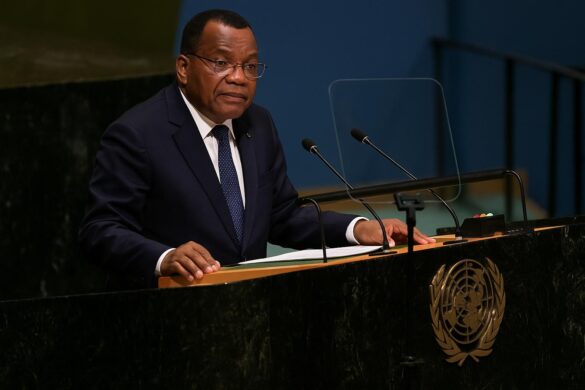Africa’s Collective Voice in New York
On September 26, three foreign ministers from Central and West Africa took the marble podium at the United Nations in New York, giving the continent a steady, unified voice during the 77th General Assembly.
Speaking within hours of each other, the ministers presented an agenda ranging from climate resilience to sovereign debt relief and the reform of global governance mechanisms.
Each minister emphasized that Africa can afford no further delays, stating that unresolved emergencies in the Sahel’s wheat fields, Congolese rainforests, or Cameroonian coastal cities are now colliding with adverse economic winds created far beyond the continent’s borders.
Brazzaville Leads Campaign for an Expanded Security Council
Addressing delegates under the blue-and-gold UN emblem, the Foreign Minister said that excluding Africa from permanent membership on the Security Council was like “rowing against the tide of history,” a phrase that drew measured applause from several African and Caribbean representatives.
He reminded the assembly that the continent represents over a billion citizens and contributes substantially to UN peacekeeping operations, yet remains marginalized in the body that authorizes these missions.
Congo-Brazzaville, which currently sits on the African Union’s Committee of Ten on reform, “will continue to engage partners in constructive dialogue,” he promised, presenting the proposal as a logical extension of the Organization’s founding principle of sovereign equality.
Diplomats familiar with the AU’s Ezulwini Consensus noted that Brazzaville’s wording reflects the long-standing AU demand for two permanent seats with veto power and five non-permanent seats for Africa, a formula many delegations now see as a pragmatic starting point.
Yaoundé Demands Concrete Answers on Climate Finance
The Cameroonian Foreign Minister placed the climate file at the forefront, warning that without the rapid disbursement of promised funds, the Paris Agreement risked remaining “ink on paper” as coastlines erode and forests burn in the Gulf of Guinea.
He linked the issue directly to food security, stating that extreme weather is compromising cassava and cocoa harvests that support rural livelihoods and urban markets.
With Egypt set to host COP27, the Cameroonian envoy urged negotiators to finalize operational details on adaptation finance and carbon markets, insisting that “decisive solutions for the planet’s survival must emerge on African soil later this year.”
He recalled that developed countries committed in 2009 to mobilize $100 billion per year by 2020, a goal still not fully met, stating that “trust in the process” depends on demonstrating that the gap will be closed before the end of the decade.
Nouakchott Calls for Swift Debt Relief to Avert Famine
The Mauritanian minister took a fiscal approach, calling on creditor nations and institutions to cancel Africa’s external debts so governments can channel funds towards urgent food imports and agricultural subsidies to prevent widespread hunger.
